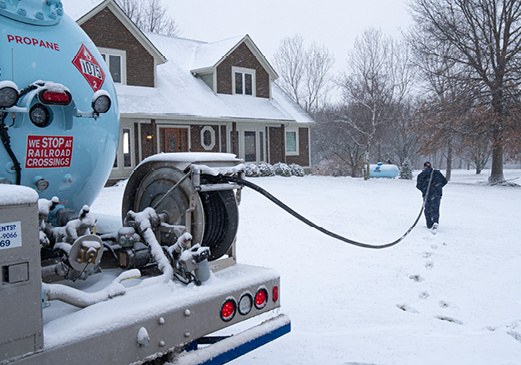How to care for propane tank in cold weather
Winter can be tough on many things, including your propane tank. While propane is a reliable fuel source, it's important to take special precautions when the temperatures drop because propane tanks are located outside in the elements. In this guide, we'll explore common questions about storing propane in cold weather and provide a few practical tips to ensure your propane tank functions smoothly all winter long.
Can propane freeze?
Many people are worried that propane will freeze during the winter. While propane has a low boiling point of -44 degrees Fahrenheit (-42 degrees Celsius), it doesn't actually freeze at typical winter temperatures. The liquid form of propane would need to reach a temp of -306 degrees Fahrenheit — more than 200 degrees colder than the lowest recorded temperature in Earth’s history — to freeze. However, extremely low temperatures can affect its vaporization, impacting its efficiency. To ensure optimal performance, we recommend routine maintenance with a trusted professional.

Practical tips for propane tanks in winter
So, how do you ensure your propane tank remains in good condition despite the chilly weather? We have a few easy tips to keep your tank in tip-top shape all winter long:
-
Refill your propane tank. Cold weather increases your heating needs, and the last thing you want during a winter storm is to run out of propane. Keep an eye on your propane tank’s level and refill it before it gets too low. Better yet, enroll in a Ferrellgas’ Auto Fill program so you don’t have to worry about scheduling fills throughout the winter months.
-
Clear the snow around your propane tank. Snow and ice buildup around your propane tank can impede its proper functioning or lead to rust. It can also make it more difficult for your propane provider to make a delivery. Regularly clear the area around the tank to prevent snow and ice accumulation. This not only ensures easy access for refilling but also reduces the risk of damage to the tank and associated components.
-
Do not attempt to heat your propane tank. It might be tempting to use external heat sources to warm up your propane tank, but this is dangerous.
Propane is stored under pressure, and exposing the tank to direct heat can compromise its structural integrity. If the pressure becomes too high, the tank could rupture, possibly cause an explosion, and may cause injuries. Your propane tank is designed to withstand the elements. You should never use improvised heating methods, no matter how cold it gets.
-
Turn off gas supply in case of leak. Leaks are more common in extreme cold as the tank contracts and expands with temperatures changes. Familiarize yourself with the smell of propane to identify a leak, make sure the batteries in your propane detector are still working, and keep your propane supplier’s emergency contact line saved in your phone. If you suspect a propane leak, leave the area and contact emergency services immediately.
CATEGORIES
Archives
- Summer 2025
- Spring 2025
- Winter 2024
- Fall 2024
- Summer 2024
- Spring 2024
- Winter 2023
- Fall 2023
- Summer 2023
- Spring 2023
- Winter 2022
- Fall 2022
- Summer 2022
- Spring 2022
- Winter 2021
- Fall 2021
- Summer 2021
- Spring 2021
- Winter 2020
- Fall 2020
- Summer 2020
- Spring 2020
- Winter 2019
- Fall 2019
- Summer 2019
- Spring 2019
- Winter 2018
- Fall 2018
- Summer 2018
- Spring 2018
- Winter 2017
